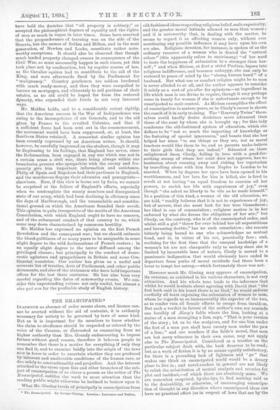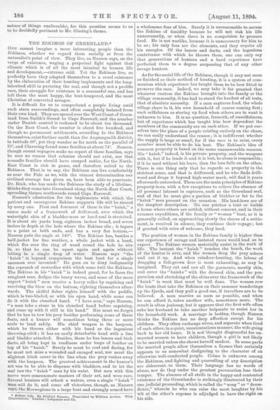THE EMANCIPATED.* INASMUCH as absence of order means chaos, and
licence can- not be averted without the aid of restraint, it is evidently necessary for sotiety to be governed by laws of some kind. But as it is important for its members to know whether the claim to obedience should be respected as uttered by the voice of the Creator, or distrusted as emanating from no higher authority than Mrs. Grundy endeavouring to impose fetters without good reason, therefore it behoves people to remember that there' is a motive for everything if only they can find it, and to examine boldly into the origin of the laws now in force in order to ascertain. whether they are produced by inherent and unalterable conditions of the human race, or due solely to conventionality and prejudice. And the interest attached to the views upon this and other branches of the sub- ject of emancipation of so clever a person as the writer of The Emancipated, entitles the work to more attention than the reading public might otherwise be inclined to bestow upon it. What Mr. Gissing treats of principally is emancipation from • The Emancipated. By George (Timing. London, Lawrence and Baton. old-fashioned ideas respecting religious belief, male superiority, and the greater moral latitude allowed to men than women ; and it is noteworthy that, in dealing with the matter, he seems to regard it as affecting women only, without ever mentioning any possible influence it may have upon his own sex also. Religious devotion, for instance, is spoken of as the ordinary resource of a woman who is denied the "natural solace" (this apparently refers to matrimony) "of her need to taste the happiness of submission to a stronger than her- self ; " and when Miriam, at first a strict Puritan, lapses into religious indifference, and becomes unhappy, she can only be restored to peace of mind by the "strong human hand" of a husband. But what use or comfort religion might be to men is never alluded to at all, and the author appears to consider it solely as a sort of pis-aller for spinsters,—an ingredient in life which man is too divine to require, though it may perhaps come in handy for woman if she is unfortunate enough to be nnsubjected to male control. As Miriam exemplifies the effect of emancipation in mature years, so in Cicely's career is shown. the result of it in early training. The "Heavenly Twins" them- selves could hardly desire doctrines more advanced than those of the aunt by whom she is brought up ; for this lady condemns the old-fashioned system of education, which she defines to be "not so much the imparting of knowledge as the fostering of special ignorances," and boasts that she has helped her niece "to see things as they are, not as moral teachers would like them to be, and as parents make-believe to their girls that they are indeed." Educated on these enlightened lines, Cicely, falling in love with a good-for- nothing scamp of whom her aunt does not approve, has no hesitation about running away and risking her reputation by travelling alone with him from Naples to London to be married. When by degrees her eyes have been opened to his worthlessness, and her love for him is killed, she is fired to revolt at not having "an equal freedom to exercise all her powers, to enrich her life with experiences of joy," even though "she asked no liberty to be vile as he made himself." In a position of this kind, a woman of the old education, we are told, "readily believes that it is not to experiences of joy, but of sorrow, that she must look for her true blessedness ; her ideal is one of renunciation ; religious motive is in her enforced by what she deems the obligation of her sex ;" but Cicely, on the contrary, who is of the emancipated order, and whilst still a girl "threw for ever behind her all superstitious and harassing doubts," has no such consolation ; she resents bitterly being bound to one who acknowledges no mutual bond, and is, in virtue of his sex, practically free ; and, realising for the first time that the unequal hardships of a woman's lot are not chargeable only to society since she is limited by inexorable laws of nature, Cicely is moved to a passionate indignation that would obviously have ended in departure from paths of moral rectitude had there been a lover to tempt her astray,—which fortunately there was not.
However much Mr. Gissing may approve of emancipation, its outcome, as exhibited in his various characters, is not very attractive. And his whole tone leads to the inference that whilst he would hesitate about agreeing with David that "the fool bath said in his heart there is no God," he would endorse cordially all texts enjoining the submission of women to men, whom he regards as so immeasurably the superior of the two, as to render vain all female efforts to escape from thraldom. But such a verdict in favour of the author's own sex reminds one forcibly of .sop's fable where the lion, looking at a statue of a man strangling a lion, says, "That is your version of the story ; let us be the sculptors, and for one lion under the feet of a man you shall have twenty men under the paw of a lion;" and one wonders if the fable's moral, that men are but sorry witnesses in their own cause, may not apply also to The Emancipated. Considered as a treatise on the particular subject dealt with, the book deserves to be read; but as a work of fiction it is by no means equally satisfactory, for there is a prevailing lack of lightness and "go" that makes one think an emancipated world would be a dreary place to live in ; and novel-readers in general are not likely to relish the substitution of mental analysis and reveries for plot and incident,—of which there are absolutely none. We are somewhat surprised, by-the-bye, to find nothing said as to the desirability, or otherwise, of encouraging emancipa- tion of thought in any direction where emancipated ideas can have no practical effect (as in respect of laws that are by the nature of things unalterable), for this question seems to us to be decidedly pertinent to Mr. Gissing's theme.



































 Previous page
Previous page